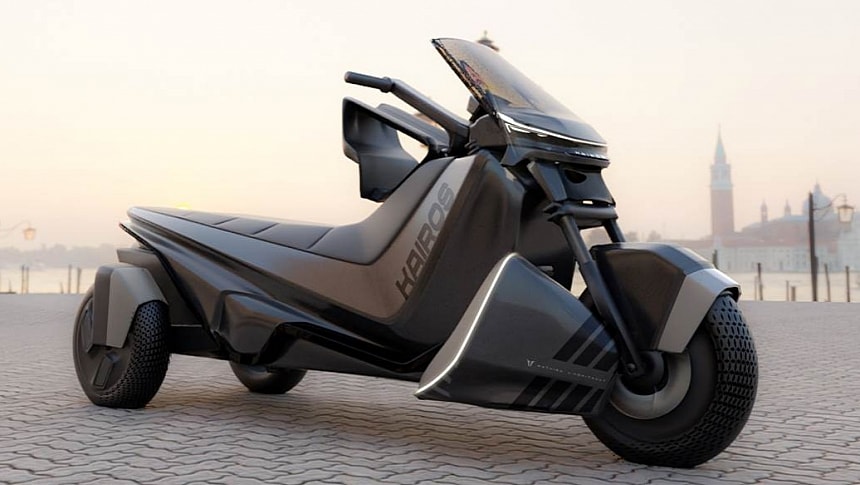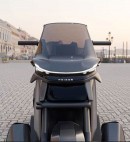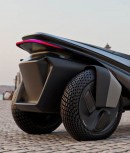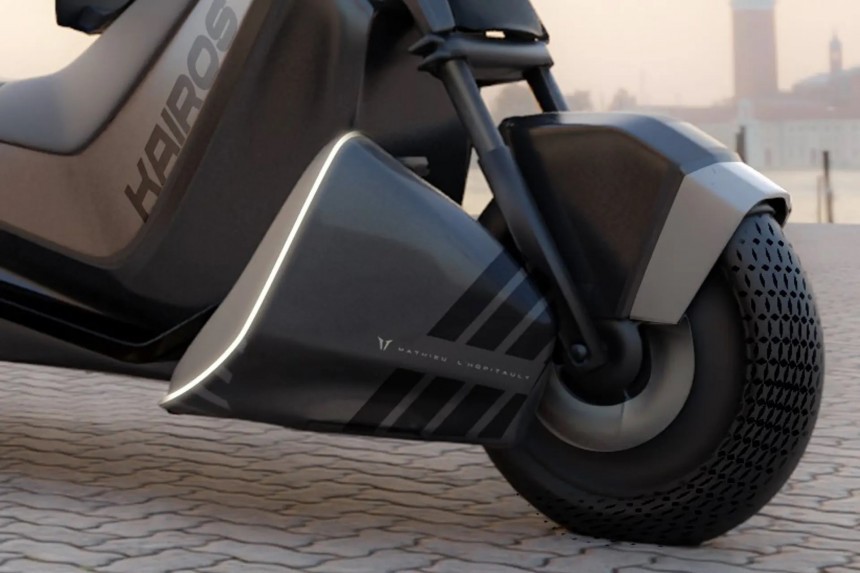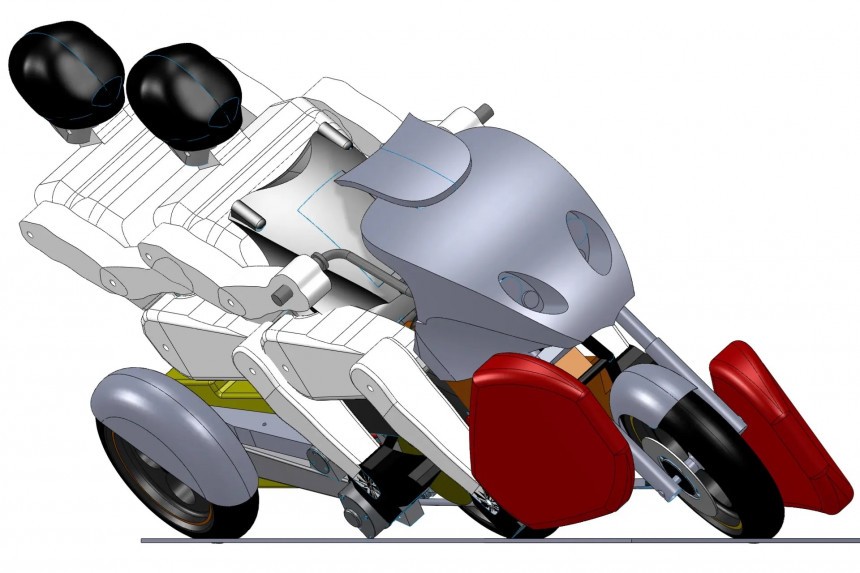Electric three-wheelers have emerged as a feasible solution for sustainable, urban transportation, combining the benefits of motorcycles and cars. However, tricycles are known to be more unstable than cars and more likely to tip over when turning corners.
A young French transport designer by the name of Mathieu L'Hopitault has conceived a groundbreaking electric three-wheeler with not one but two innovative systems that address these safety issues. It's called the Kairos EV and boasts a modern, narrow, three-wheeled tilting architecture designed to keep riders upright as they nip around.
The tricycle, which is currently in its pre-prototype stage, is being developed through SIREMS Association, a nonprofit electric mobility group based in France. It is a two-passenger vehicle with a delta configuration, meaning it has two wheels at the rear and one wheel in front that does the steering. It might be a less common three-wheeler design, but it offers better stability when compared to those with two wheels in the front, as it has a wider base of support.
The delta configuration is complemented by a semi-reclined, feet-forward riding position, which leads to better weight distribution and ultimately can contribute to improved balance and traction, especially when carrying passengers or heavy loads. Moreover, Kairos is said to offer impressive agility thanks to its ability to lean into turns. The rear wheels tilt relative to its main body when turning around a corner, allowing the rider to maneuver the vehicle just like a motorcycle.
The designer went a little bit further in his quest to improve stability and outfitted the Kairos EV with a pair of Mobile Lateral Elements (MLEs), some wedge-shaped accessories attached to either side of the front wheel meant to prevent the vehicle from tipping over when taking sharp turns and to enhance overall safety. Just like the rear wheels, these attachments tilt when the vehicle leans into turns and act like counterweights to prevent tip-overs.
Besides ensuring that the trike is not limited to very slow tight turns, the MLEs are said to absorb impact energy in frontal and side collisions, boost aerodynamics, and help keep the vehicle's center of gravity low.
The second safety feature installed on the Kairos is called the Programmed Restraint Device (PRD) and is intended to significantly reduce the risk of serious injury in the event of a frontal impact. The PRD is essentially a chest pad mounted in the cockpit and keeps the rider from flying over the handlebars in the event of a collision. The device has a triangular shape and is hinged at the front and locked electrically at the rear. In the event of a flip, the device's lock disengages automatically, allowing the rider to be ejected from harm's way.
Moreover, both the MLEs and the PRD device can be used as cargo spaces, though the trike also has a main cargo compartment located between the rear wheels.
With these innovative safety features thrown into the mix, the Kairos conceptual vehicle promises to deliver a balanced mix of bike-like fun and car-like stability in today's urban environments. However, Philippe Girardi, the founder of SIREMS Association, said in a statement that, "Although safety is the backdrop to this project, we don't want to offer a boring product. We've tried to ensure that each of the safety features also provides a visible benefit for the customer: more storage space, improved aerodynamics, a cool design, new dynamic characteristics, and a new driving experience."
Though it is still too early to detail the specs of the electric three-wheeler, we know that a rolling demonstrator vehicle should be ready for testing by the end of the first quarter of 2025. The company aims to introduce the Kairos EV to the market by 2028, and pricing is estimated to hover around the €30,000 (or approx. $32,650) mark.
The tricycle, which is currently in its pre-prototype stage, is being developed through SIREMS Association, a nonprofit electric mobility group based in France. It is a two-passenger vehicle with a delta configuration, meaning it has two wheels at the rear and one wheel in front that does the steering. It might be a less common three-wheeler design, but it offers better stability when compared to those with two wheels in the front, as it has a wider base of support.
The delta configuration is complemented by a semi-reclined, feet-forward riding position, which leads to better weight distribution and ultimately can contribute to improved balance and traction, especially when carrying passengers or heavy loads. Moreover, Kairos is said to offer impressive agility thanks to its ability to lean into turns. The rear wheels tilt relative to its main body when turning around a corner, allowing the rider to maneuver the vehicle just like a motorcycle.
Besides ensuring that the trike is not limited to very slow tight turns, the MLEs are said to absorb impact energy in frontal and side collisions, boost aerodynamics, and help keep the vehicle's center of gravity low.
The second safety feature installed on the Kairos is called the Programmed Restraint Device (PRD) and is intended to significantly reduce the risk of serious injury in the event of a frontal impact. The PRD is essentially a chest pad mounted in the cockpit and keeps the rider from flying over the handlebars in the event of a collision. The device has a triangular shape and is hinged at the front and locked electrically at the rear. In the event of a flip, the device's lock disengages automatically, allowing the rider to be ejected from harm's way.
Moreover, both the MLEs and the PRD device can be used as cargo spaces, though the trike also has a main cargo compartment located between the rear wheels.
Though it is still too early to detail the specs of the electric three-wheeler, we know that a rolling demonstrator vehicle should be ready for testing by the end of the first quarter of 2025. The company aims to introduce the Kairos EV to the market by 2028, and pricing is estimated to hover around the €30,000 (or approx. $32,650) mark.
